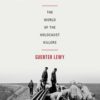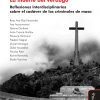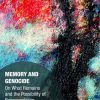Books

The Malmedy Massacre: The War Crimes Trial Controversy
By Steven Remy. During the Battle of the Bulge, Waffen SS soldiers shot 84 American prisoners near the Belgian town of Malmedy—the deadliest mass execution of U.S. soldiers during World War II. The bloody deeds of December 17, 1944, produced the most controversial war crimes trial in American history. Drawing on newly declassified documents, Steven…
Read more
Perpetrators: The World of the Holocaust Killers
By Guenter Lewy. The Nazis’ attempt to annihilate the Jewish people, the Holocaust, continues to raise a disturbing question. About six million defenseless men, women, and children were murdered for no reason but their ancestry. Close to two million Jews were killed in mass shootings, while the remainder were asphyxiated or worked and starved to…
Read more
Genocide: A World History
By Norman N. Naimark. Genocide occurs in every time period and on every continent. Using the 1948 U.N. definition of genocide as its departure point, this book examines the main episodes in the history of genocide from the beginning of human history to the present. Norman M. Naimark lucidly shows that genocide both changes over time,…
Read more
Perpetrators in Holocaust Narratives: Encountering the Nazi Beast
By Joanne Pettitt. This study provides a comprehensive analysis of representations of Holocaust perpetrators in literature. Such texts, often rather controversially, seek to undo the myth of pure evil that surrounds the Holocaust and to reconstruct the perpetrator in more human (“banal”) terms. Following this line of thought, protagonists frequently place emphasis on the contextual or situational…
Read more
Negotiating Genocide in Rwanda: The Politics of History
By Erin Jessee. This book is an oral history-based study of the politics of history in the aftermath of the 1994 genocide in Rwanda. Using life history and thematic interviews, the author brings the narratives of officials, survivors, returnees, perpetrators, and others whose lives have been intimately affected by genocide into conversation with scholarly studies…
Read more
The Holocaust and European Societies: Social Processes and Social Dynamics
Edited by Frank Bajohr and Andrea Löw. This book explores the Holocaust as a social process. Although the mass murder of European Jews was essentially the result of political-ideological decisions made by the Nazi state leadership, the events of the Holocaust were also part of a social dynamic. All European societies experienced developments that led to the social…
Read more
La muerte del verdugo. Reflexiones interdisciplinarias sobre el cadáver de los criminales de masa
The last decade witnessed the death of a number of notable war criminals, perpetrators of genocide, dictators and terrorists, amongst these Slobodan Milosevic, Augusto Pinochet, Saddam Hussein, Osama Ben Laden and Muammar Gaddafi. Though the circumstance of each death may differ greatly, the questions each death raises are the same: when and how did these criminals…
Read more
The Emergence of Historical Forensic Expertise: Clio Takes the Stand
Vladimir Petrovic This book scrutinizes the emergence of historians participating as expert witnesses in historical forensic contribution in some of the most important national and international legal ventures of the last century. It aims to advance the debate from discussions on whether historians should testify or not toward nuanced understanding of the history of the…
Read more
Memory and Genocide: On What Remains and the Possibility of Representation
Edited by Fazil Moradi, Ralph Buchenhorst and Maria Six-Hohenbalken This book focuses on ethical, aesthetic and scholarly dimensions of how genocide-related works of art, documentary films, poetry and performance, museums and monuments, music, dance, image, law, memory narratives, spiritual bonds, and ruins translate and take place as translations of acts of genocide. It shows how genocide-related modes of…
Read more
Itinerary of an Ordinary Torturer: Interview with Duch, Former Khmer Rouge Commander of S-21
By Christophe Peschoux and Haing Kheng Heng Kaing Guek Eav was an ordinary young man growing up in Cambodia in the mid-twentieth century. He showed promise as a student, excelled in school, got a job as a math teacher, and experienced the political awakening common to young adulthood. But then he became a revolutionary,…
Read more
